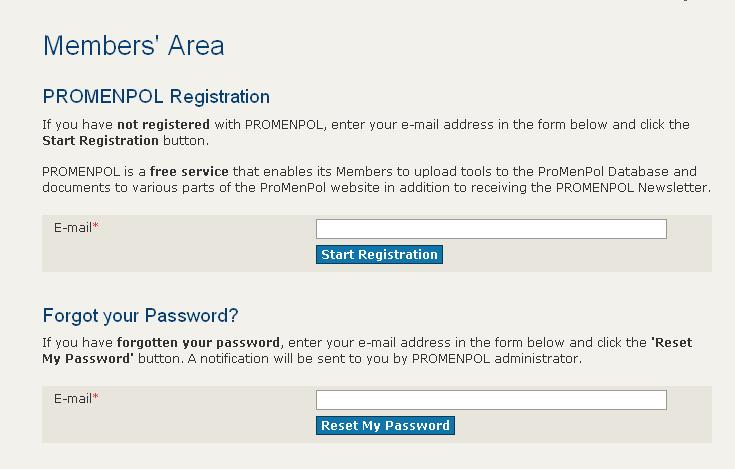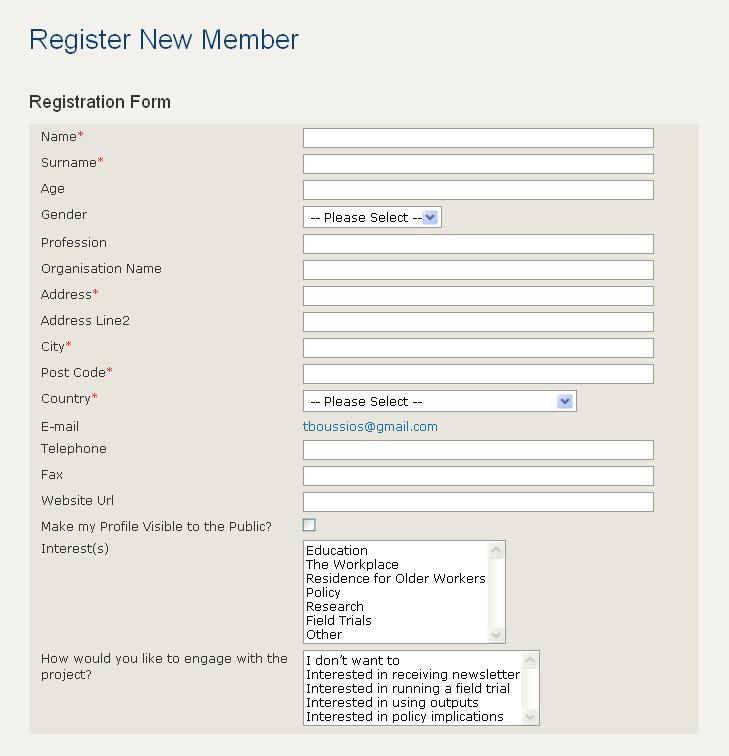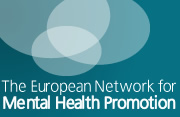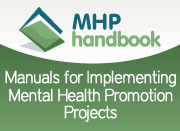Tools
- Utilities:
- Print this page
- Send this page
- Font size:
- Increase font size
- Decrease font size
Newsletter Issue No. 12
09/02/2010 - Submitted by: Tilia Bousios
ProMenPol Credits
Dear colleagues, After the successful completion of the ProMenPol project this will be our last newsletter. The ProMenPol Team would like to take the opportunity to thank everybody for their enormous support, contribution and feedback. We have enjoyed working with you. New challenges and projects are coming up and we would like to place ProMenPol also in your hands. Once you have registered as a member for the ProMenPol website (free registration), you have several possibilities to disseminate your own events, news, documents and even tools. For a short explanation how this can be done, please scroll down to the end of this newsletter.
We are quite confident that ProMenPol lives on, therefore let this rather be a bye-for-now instead of a farewell.
All the best,
Dr. Karl Kuhn
on behalf of the ProMenPol-Team
The Mental Health Promotion Network (MHPNet)
The ProMenPol database includes more than 400 globally available tools. With the end of this project the members of the ProMenPol consortium have decided to continue the work and maintenance of the website. Moreover, the consortium sees the need to create a global network for mental health promotion building on the work ProMenPol and offering a broad scope of mental health promotion tools.
Mental Health Promotion is a top priority not only for Europe: the economic crisis has shown that the burden of this crisis manifests itself in mental ill health. To promote the resilience of individuals with innovative tools is one of the future ambitions of MHPNet.
A lot of policies show the need for such a network:
One of the four priority areas of the 2005 re-launch of the Lisbon Strategy on Growth and Jobs has been to ‘invest in people and modernise labour markets’. More specifically, the objectives of the strategy include improving the skills, employability and adaptability of the workforce, as well as promoting the functioning of labour markets in the EU, including the greater participation of population groups that currently face difficulties and may be excluded from the labour market. Promoting and maintaining good mental health and wellbeing in the workplace is of key relevance to the achievement of these objectives across the European Union.
This importance of mental health and wellbeing is also recognised in the Community Strategy on Health and Safety at Work for 2007-2012. This refers to the contribution that guaranteeing quality and productivity at work can play in promoting economic growth and employment. It highlights the common and increasing contributions of stress and poor mental health as reasons for work absenteeism and occupational disability. Taking account of projections from the WHO that psychological problems will be the principle source of incapacity by 2020, it advocates a change towards a more preventive culture, including making the promotion of mental health at the workplace a priority.
The Commission White Paper "Together for Health: A Strategic Approach for the EU 2008-2013" in emphasising the substantial economic costs of mental disorders, noted that the majority of these are due to lost productivity in the workplace. Community actions in the field of mental health and measures to promote the health of the workforce were announced in this document.
With over 800 newsletter recipients, over 250 conference participants, 60 policy workshop participants and more than 40.000 hits per month on the website, the ProMenPol project has already created an informal network in the field of mental health promotion across Europe. In the context of two follow-up projects the enhancement this network is ensured. Additionally, two new projects will build on the ProMenPol work with 1) the conceptualisation of an MHP E-learning tool and 2) the preparation of handbooks for mental health promotion.
Until the network has been formalised in a more official way, the ProMenPol newsletter will be continued on a quarterly basis on behalf of the network. More information about the follow-up projects and network activities will be available at www.mentalhealthpromotion.net
John Henderson
In early January we heard the sad news the Dr. John Henderson, a member of the ProMenPol project team whom many of you will have known and respected, died on the 4th January. John passed away peacefully at home, in the company of his family, and after a characteristically determined and dignified fight with cancer.
John served Mental Health Europe as a senior policy adviser, and the Director of Mental Health Europe, Mary van Dievel said:
"We will all deeply miss him, but we are lucky to have such good memories of all he has done. John was a true European, believing deeply in the benefits that come with partnerships and collaboration in Europe and the European Union. He dedicated his life to improve the lives of others less fortunate. Lately he had been involved in working towards a better mental health for people and communities in Europe. We will not only miss John for the warm person he was, but we will also miss the wisdom he had and shared."
Writing in The Scotsman newspaper, Dr Bill Boyd summarised some of John's career achievements:
"In 1976 he was appointed mental health adviser to the World Health Organisation's south-east Asia office. Based in New Delhi, Henderson brought his expertise and passion to a huge "parish", which stretched from Pakistan to Outer Mongolia, serving a quarter of the world's population. His accounts of his travels and his meetings with local political, medical and community leaders were always fascinating, and his special skills in firm and fair diplomacy, and his experience and abilities in bringing people, professions and politicians together helped make an impact in a region where, at the time, mental health and the rights of people with mental illness were significantly neglected.
Returning in 1980 to Europe, this time as the mental health adviser to WHO's European office in Copenhagen, he remained for the next five years involved in developing a wide range of mental health programmes across Europe at a time of considerable political and social upheaval. His work focused on the reform of psychiatry and the de-institutionalisation of outdated asylums in eastern European countries, helping to ensure they addressed some of the appalling human rights abuses suffered by the mentally ill.
He threw himself into the European mental health scene - first with the European Council of the World Federation of Mental Health, becoming president from 1994-97."
Some of you will know Gregor and Nigel, two of John's four sons through their work on mental health work. Over the last few years I came to know him through the work I have been doing on an EU level. John was a psychiatrist, in the social mould. He cared for people, not disorders, and from his early days in practice in Aberdeenshire to his last days of work only months ago, he was tirelessly committed to the cause, and took it, with eloquence and effect to the highest levels of policy and government.
At the Scottish Office and later with the WHO in South East Asia and Europe, John championed dignity for people with mental illness, de-institutionalisation, recovery, and person centeredness. When he retired from clinical practice he continued to work tirelessly for NGOs in mental health.
He was one of the international observers who worked with the EC and Greek government to open up the hospital on the island of Leros, where many people with mental health problems were treated appallingly, isolated and restrained. He helped change the system, with the support of the EC and the government, bridging the gaps, and bringing together disparate viewpoints. He continued this work in eastern and south-eastern Europe in the last decade. He will be sorely missed there.
John managed to reach and influence policy and politicians at highest level, whilst never 'selling short' the ordinary man or vulnerable person for the often tempting compromise that risks being a lowest common denominator. He taught me a lot about dancing on that line, about harnessing passion and drive so it becomes fusion and not fission. I was privileged indeed to be able to call on his advice, and learn at his feet.
Chris O'Sullivan
Dissemination Possibilities with ProMenPol Website
The ProMenPol website was designed to act as a pan-European gateway to results, documentation and related issues emanating from the project. Additionally, the website holds several possibilities for registered members to disseminate their own results, tools, events and news.
For ProMenPol members accessible parts of the website include the following sections:
News & Events: Here latest developments in the field of mental health promotion can be published ranging from conference announcements, project launches, new publications to policy developments. Newly added events and news will be displayed in the right hand column on the ProMenPol website’s main page.
Projects: Here projects related to mental health (and its promotion) can be entered and described. Mainly projects which are primarily undertaken on a European level have been entered. However the section is open to actions on national and local level, too.
Networks and other Organisations: The section contains links to mental health associated networks and organisations.
Policy Documents: Policy related documents in the field of mental health (promotion), such as the European Pact for Mental Health and Well-Being are entered here. These policy documents may relate to activities and actions on both a European level as well as a national level.
Bibliography: References to (scientific) articles regarding mental health and public health are provided in this section. The section is open to English references as well as publications in other languages.
Database: In addition to retrieving tools form the ProMenPol Database, it is also possible for registered members to upload tools to the database themselves.
In addition, registered member receive the ProMenPol newsletter which is send out on a quarterly basis and is used as a vehicle to disseminate information about latest developments in the field mental health promotion.

In order to become a ProMenPol member users must sign up using the ‘Sign up Now!’ link provided on the left side of the screen – just below the ‘Login’ button in the Members Area.
Once accessed, users are provided with the ‘Members Area-ProMenPol Registration’ screen which requests the users email address for verification purposes and the commencement of the registration process.
Please Note, when the ‘start registration’ button is clicked an e-mail notification will be automatically sent to the user’s e-mail along with their members password.

Once a valid email is entered and the start registration button is clicked users are provided with the following ‘Members Profile’ screen (next page).

The Members Profile screen asks users to complete basic information about themselves and the respective organisation that they represent. Additionally, questions about how they would like to engage with the project are asked as is the privacy question “Make My Profile Visible to the Public?”.
Once the registration process is completed, users may then login using the ‘members area login’ screen and begin to add their events, news, publications and tools to the ProMenPol database.
A full description on how to enter tools in the ProMenPol database can be found at: ProMenPol Database Description



